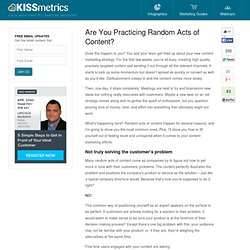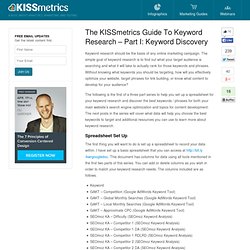

Are You Practicing Random Acts of Content? Does this happen to you?

You and your team get fired up about your new content marketing strategy. For the first few weeks, you’re all busy, creating high quality, precisely targeted content and sending it out through all the relevant channels. It starts to pick up some momentum but doesn’t spread as quickly or convert as well as you’d like. Disillusionment creeps in and the content comes more slowly. Then, one day, it stops completely. What’s happening here?
Not truly solving the customer’s problem Many random acts of content come as companies try to figure out how to get more in tune with their customers’ problems. This common way of positioning yourself as an expert appears on the surface to be perfect. First time users engaged with your content are asking: How does this product truly solve my problems? Users familiar with your content (but who haven’t purchased) are asking: Create measurable goals This new content marketing strategy is really starting to pay off. Optimizing beyond SEO. The KISSmetrics Guide To Keyword Research - Part I: Keyword Discovery. Keyword research should be the basis of any online marketing campaign.

The simple goal of keyword research is to find out what your target audience is searching and what it will take to actually rank for those keywords and phrases. Without knowing what keywords you should be targeting, how will you effectively optimize your website, target phrases for link building, or know what content to develop for your audience? The following is the first of a three part series to help you set up a spreadsheet for your keyword research and discover the best keywords / phrases for both your main website’s search engine optimization and topics for content development.
The next posts in the series will cover what data will help you choose the best keywords to target and additional resources you can use to learn more about keyword research. Spreadsheet Set Up The first thing you will want to do is set up a spreadsheet to record your data within. Saving the Google Docs Version Keyword Discovery SEMrush. How To Do Keyword Research - The Beginners Guide to SEO. Chapter 3 Understand what your audience wants to find.

Now that you’ve learned how to show up in search results, let’s determine which strategic keywords to target in your website’s content, and how to craft that content to satisfy both users and search engines. The power of keyword research lies in better understanding your target market and how they are searching for your content, services, or products. Keyword research provides you with specific search data that can help you answer questions like: What are people searching for? In this chapter, you'll get tools and strategies for uncovering that information, as well as learn tactics that'll help you avoid keyword research foibles and build strong content.
Before you can help a business grow through search engine optimization, you first have to understand who they are, who their customers are, and their goals. This is where corners are often cut. Here’s an example. What types of ice cream, desserts, snacks, etc. are people searching for?